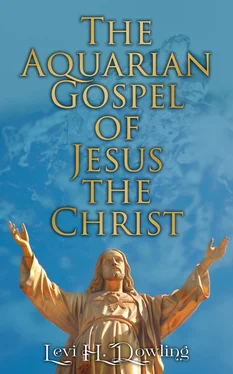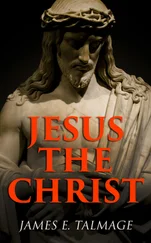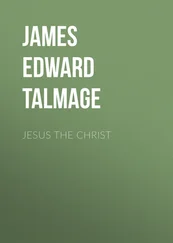4. Udraka taught the uses of the waters, plants and earths; of heat and cold; sunshine and shade; of light and dark.
5. He said, The laws of nature are the laws of health, and he who lives according to these laws is never sick.
6. Transgression of these laws is sin, and he who sins is sick.
7. He who obeys the laws, maintains an equilibrium in all his parts, and thus insures true harmony; and harmony is health, while discord is disease.
8. That which produces harmony in all the parts of man is medicine, insuring health.
9. The body is a harpsichord, and when its strings are too relaxed, or are too tense, the instrument is out of tune, the man is sick.
10. Now, everything in nature has been made to meet the wants of man; so everything is found in medical arcanes.
11. And when the harpsichord of man is out of tune the vast expanse of nature may be searched for remedy; there is a cure for every ailment of the flesh.
12. Of course the will of man is remedy supreme; and by the vigorous exercise of will, man way make tense a chord that is relaxed, or may relax one that is too tense, and thus may heal himself.
13. When man has reached the place where he has faith in God, in nature and himself, he knows the Word of power; his word is balm for every wound, is cure for all the ills of life.
14. The healer is the man who can inspire faith. The tongue may speak to human ears, but souls are reached by souls that speak to souls.
15. He is the forceful man whose soul is large, and who can enter into souls, inspiring hope in those who have no hope, and faith in those who have no faith in God, in nature, nor in man.
16. There is no universal balm for those who tread the common walks of life.
17. A thousand things produce inharmony and make men sick; a thousand things may tune the harpsichord, and make men well.
18. That which is medicine for one is poison for another one; so one is healed by what would kill another one.
19. An herb may heal the one; a drink of water may restore another one; a mountain breeze may bring to life one seeming past all help;
20. A coal of fire, or bit of earth, may cure another one; and one may wash in certain streams, or pools, and be made whole.
21. The virtue from the hand or breath may heal a thousand more; but love is queen. Thought, reinforced by love, is God's great sovereign balm.
22. But many of the broken chords in life, and discords that so vex the soul, are caused by evil spirits of the air that men see not; that lead men on through ignorance to break the laws of nature and of God.
23. These powers act like demons, and they speak; they rend the man; they drive him to despair.
24. But he who is a healer, true, is master of the soul, and can, by force of will, control these evil ones.
25. Some spirits of the air are master spirits and are strong, too strong for human power alone; but man has helpers in the higher realms that may be importuned, and they will help to drive the demons out.
26. Of what this great physician said, this is the sum. And Jesus bowed his head in recognition of the wisdom of this master soul, and went his way.
Table of Contents
1. Four years the Jewish boy abode in temple Jagannath.
2. One day he sat among the priests and said to them, Pray, tell me all about your views of castes; why do you say that all men are not equal in the sight of God?
3. A master of their laws stood forth and said, The Holy One whom we call Brahm, made men to suit himself, and men should not complain.
4. In the beginning days of human life Brahm spoke, and four men stood before his face.
5. Now, from the mouth of Parabrahm the first man came; and he was white, was like the Brahm himself; a brahman he was called.
6. And he was high and lifted up; above all want he stood; he had no need of toil.
7. And he was called the priest of Brahm, the holy one to act for Brahm in all affairs of earth.
8. The second man was red, and from the hand of Parabrahm he came; and he was called shatriya.
9. And he was made to be the king, the ruler and the warrior, whose highest ordained duty was protection of the priest.
10. And from the inner parts of Parabrahm the third man came; and he was called a visya.
11. He was a yellow man, and his it was to till the soil, and keep the flocks and herds.
12. And from the feet of Parabrahm the fourth man came; and he was black; and he was called the sudras, one of low estate.
13. The sudra is the servant of the race of men; he has no rights that others need respect; he may not hear the Vedas read, and it means death to him to look into the face of priest, or king, and naught but death can free him from his state of servitude.
14. And Jesus said, Then Parabrahm is not a God of justice and of right; for with his own strong hand he has exalted one and brought another low.
15. And Jesus said no more to them, but looking up to heaven he said,
16. My Father-God, who was, and is, and evermore shall be; who holds within thy hands the scales of justice and of right;
17. Who in the boundlessness of love has made all men to equal be. The white, the black, the yellow, and the red can look up in thy face and say, Our Father-God.
18. Thou Father of the human race, I praise thy name.
19. And all the priests were angered by the words which Jesus spoke; they rushed upon him, seized him, and would have done him harm.
20. But then Lamaas raised his hand and said, You priests of Brahm, beware! you know not what you do; wait till you know the God this youth adores.
21. I have beheld this boy at prayer when light above the light of the sun surrounded him. Beware! his God may be more powerful than Brahm.
22. If Jesus speaks the truth, if he is right, you cannot force him to desist; if he is wrong and you are right, his words come to naught, for right is might, and in the end it will prevail.
23. And then the priests refrained from doing Jesus harm; but one spoke out and said,
24. Within this holy place has not this reckless youth done violence to Parabrahm? The law is plain; it says, He who reviles the name of Brahm shall die.
25. Lamaas pled for Jesus' life; and then the priests just seized a scourge of cords and drove him from the place.
26. And Jesus went his way and found shelter with the black and yellow men, the servants and the tiller of the soil.
27. To them he first made known the gospel of equality; he told them of the Brotherhood of Man, the Fatherhood of God.
28. The common people heard him with delight, and learned to pray, Our Father-God who art in heaven.
Table of Contents
1. When Jesus saw the sudras and the farmers in such multitudes draw near to hear his words, he spoke a parable to them; he said:
2. A nobleman possessed a great estate; he had four sons, and he would have them all grow strong by standing forth and making use of all the talents they possess.
3. And so he gave to each a share of his great wealth, and bade them go their way.
4. The eldest son was full of self; he was ambitious, shrewd and quick of thought.
5. He said within himself, I am the oldest son, and these, my brothers, must be servants at my feet.
6. And then he called his brothers forth; and one he made a puppet king; gave him a sword and charged him to defend the whole estate.
7. To one he gave the use of lands and flowing wells, and flocks and herds, and bade him till the soil, and tend the flocks and herds and bring to him the choicest of his gains.
8. And to the other one he said, You are the youngest son; the broad estate has been assigned; you have no part nor lot in anything that is.
9. And he took a chain and bound his brother to a naked rock upon a desert plain, and said to him,
Читать дальше












